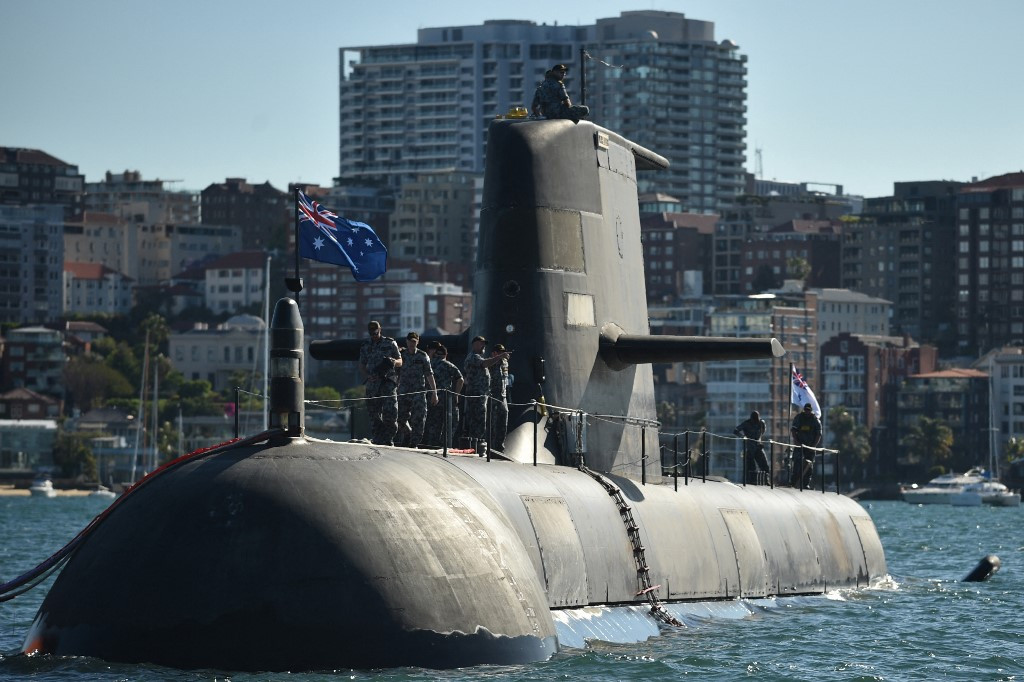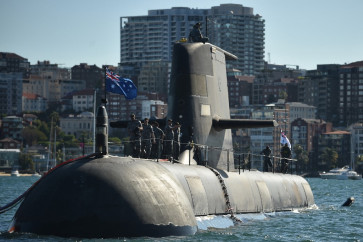Popular Reads
Top Results
Can't find what you're looking for?
View all search resultsPopular Reads
Top Results
Can't find what you're looking for?
View all search resultsIndonesia to lobby UN over lacking supervision of nuclear technology
In its submission for an upcoming conference, the Indonesian government said it “notes with concern the potential consequences” that transferring nuclear submarine technology could have for the global non-proliferation regime.
Change text size
Gift Premium Articles
to Anyone
 The Royal Australian Navy's HMAS Waller (SSG 75), a Collins-class diesel-electric submarine, is seen in Sydney Harbour on Nov. 2, 2016. Australia scrapped a multi-billion-euro submarine deal with France in favor of nuclear-powered American and British alternatives, sparking fears of an arms race. (AFP/Peter Parks)
The Royal Australian Navy's HMAS Waller (SSG 75), a Collins-class diesel-electric submarine, is seen in Sydney Harbour on Nov. 2, 2016. Australia scrapped a multi-billion-euro submarine deal with France in favor of nuclear-powered American and British alternatives, sparking fears of an arms race. (AFP/Peter Parks)
I
ndonesia plans to put the problems surrounding nuclear submarine technology front and center at a crucial United Nations review of the nuclear non-proliferation treaty later this month, even as neighboring Australia plans to acquire such vessels with the help of the nuclear-armed United States and United Kingdom through the AUKUS pact.
Speaking at a press conference on Sunday night, the Foreign Ministry’s Multilateral Affairs Director General Tri Tharyat confirmed that Indonesia had submitted a draft working paper to the UN that called for tight supervision by the International Atomic Energy Agency (IAEA) for any country looking to develop nuclear-powered submarines.
In its submission, the government said it “notes with concern the potential consequences” that transferring such nuclear technology could have for the global non-proliferation regime. It does not directly reference Australia, and officials have reportedly said that it was not a direct response to the AUKUS pact.
“The working paper, now known as the Indonesian Paper, [is our effort] to raise awareness on this issue. It is also our concrete effort to save lives, and most importantly, to fill in the void in international law regarding nuclear-powered submarines,” the senior ministry official said.
There are currently only six countries in the world with nuclear-powered submarines: the US, the UK, Russia, France, China and India. Brazil and Australia, however, are developing their own nuclear-powered arsenals, although the governments of both countries have stressed that they have not violated any international regulations and that they continue to follow IAEA rules.
However, Tri said that other countries would continue to stand against the development of such technology, particularly due to the fear that its supervision would be difficult and that it might lead to more countries developing their own nuclear weapons.
The paper also raised the issue of potential nuclear leakages and radiation, which the government insists is likely to occur during the transportation, maintenance and use of nuclear-powered submarines.

















